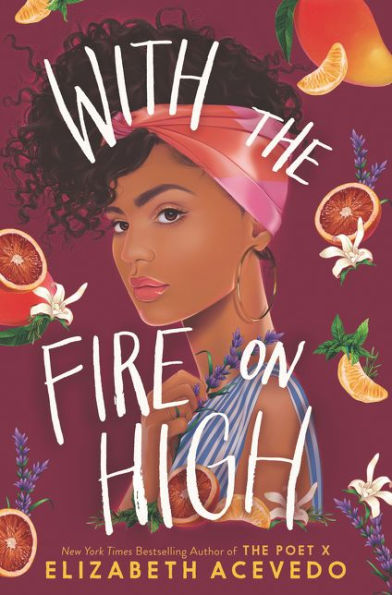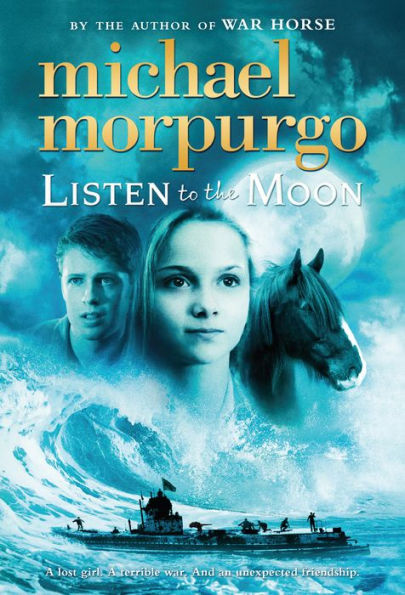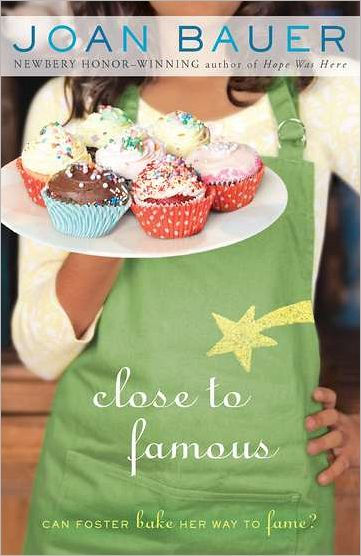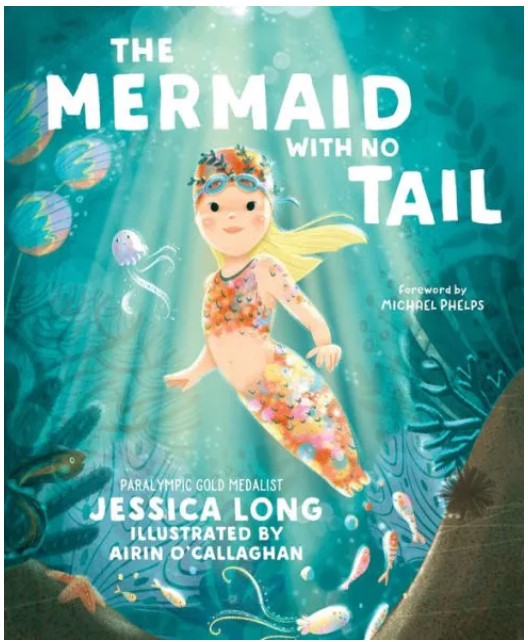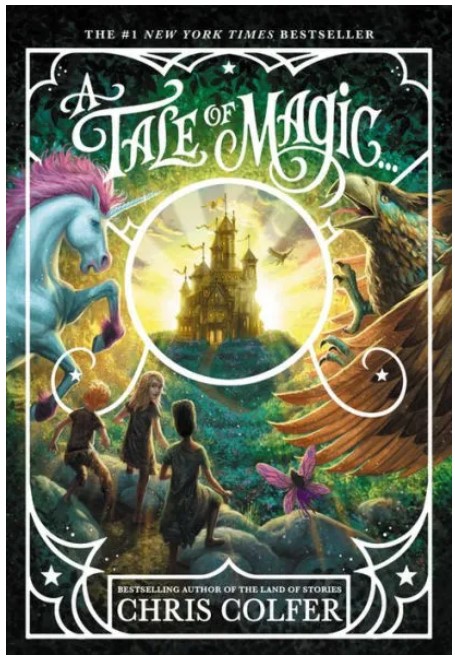Emoni, a Philadelphia teenager, has aspirations of being a chef. Through her cooking, she is able to explore her identity as an African-American, as well as her Puerto Rican ancestry. Emoni’s family also forms a central role in her life. Her dad is a Puerto Rican activist and community organizer, but he is often absent. Emoni lives with her Puerto Rican abuela and her two-year-old daughter, who she conceived during her first year of high school. Now a senior, Emoni is learning to juggle her family, her academics, her personal life, her job, and her love of cooking.
At the beginning of the school year, Emoni learns that her school is introducing a culinary arts class. She is unsure if she will be able to balance it with her other commitments, and has a hard time warming up to the chef who teaches the class. Though they get off to a rough start, the chef soon becomes an important mentor for Emoni. She learns the importance of following directions in the kitchen, which is a place where she is used to doing whatever she wants.
Meanwhile, Emoni meets Malachi, a new student. She is hesitant to become friends, but they soon become close. Malachi becomes Emoni’s romantic interest. He is a sensitive boy who respects and cares for Emoni. Their relationship develops slowly through the course of the book. Malachi courts Emoni by showing that he is willing to accommodate her family situation: he is respectful towards her abuela and daughter.
With the Fire on High is heartfelt and expertly written. Readers will relate to Emoni’s struggle to decide whether she will go to college, and what shape her future will take. Readers will quickly find themselves rooting for Emoni and her family. They will cheer at her victories and feel distressed at her losses. The first-person narration paints a vivid picture of Emoni’s culture, her family, her personality, and how food plays an emotional role in her life.
With the Fire on High has mature themes and sexual content, but it is handled maturely. Sex is not glorified or demonized. When Emoni and Malachi become intimate, they do so because both of them feel emotionally ready. Emoni also struggles with the decision to date because of her many responsibilities. Emoni only brings Malachi around her child when she is certain that he’ll be a good influence.
With the Fire on High uses a unique character voice and vivid descriptions of food to draw the readers into the setting. The description of every character is strong, but especially Emoni’s. Her stubborn personality, her love for her daughter, and her unique narration all help her to come alive on the page. Readers will be able to relate to some piece of Emoni, but she is, by and large, her own distinct personality. The lessons she learns throughout the story will resonate with any reader. This is a coming-of-age story, and Emoni’s maturity is marked by her ability to make choices that will let her support her family while still caring for herself.
Sexual Content
- The main character, Emoni, is a teen mother. She describes her first sexual experience—with her child’s father—as something “a lot more technical” than she expected and indicates that the experience was disappointing and confusing because she wasn’t ready. “When he finally shoved into me, it stung. For a second, I wasn’t sure if I wanted to push him away or pull him closer, and then he was panting and sweating on my chest and apologizing. . . I cleaned my own self up, put on my pants, and left. He didn’t even say goodbye.”
- The chef encourages the cooking class to “come eat Emoni’s chocolate pudding.” Many of the boys take this as an innuendo and tease Emoni about it, but the double entendre is never explained.
- When Emoni and Malachi kiss for the first time, “His hand moves down to my butt and curves around it.”
- Emoni and Malachi make out on a couch and make the decision to be intimate. Emoni’s “legs straddling his lap, arms wound around his back. Kissing him back. . . I never saw what the big deal was about it, outside of how nice it was to be touched. But this is different. . . He keeps kissing my neck. And then my hands are everywhere. I need to touch his skin, his shoulders, his back. I kiss his ear and he moans into my neck. ‘This feels too good.’ And this was new, too. This power of making a boy jump or moan.” The scene continues for about three pages, and while it’s implied that they become sexually intimate, the narration does not describe the rest of their encounter.
- Emoni’s best friend Angelica, a lesbian, has an anniversary dinner with her girlfriend and is nervous about having sex for the first time. She has had sex with guys before, but “this is less about exploring, and more about expressing.” Emoni tells her, “You don’t have to do anything you aren’t comfortable doing.”
Violence
- Malachi tells Emoni that his brother “was killed last February. Some beef in the neighborhood back home and he was shot. It’s unclear if it was a stray bullet or meant for him.”
- In Spain, when a child steals Emoni’s purse, Malachi runs after the child and grabs him “by the back of his coat.” Emoni is concerned that Malachi will hurt the child, but he lets him go.
Drugs and Alcohol
- During their trip to Spain, Emoni chooses to abstain, but some of her classmates get drunk. This ends in her classmate getting so drunk that she throws up. The next day, the student can’t remember what happened.
- Emoni makes herself a meal and pours herself a glass of wine. She thinks, “I know [my grandmother will] raise an eyebrow when she sees I had some, but she won’t reprimand me; growing up, she was allowed to drink from the time she was fourteen and she finds the alcohol rules on the mainland excessive.”
- Malachi jokingly asks a flight attendant for a glass of wine.
- Emoni cooks with beer; the book includes a recipe for beer bread.
Language
- Throughout the book, Emoni and her friend Angelica try to curb their language so they won’t be a bad influence on Emoni’s daughter. Slips like “shit—I mean, shoot” and “damn—I mean, darn” are frequent.
- Emoni’s first-person narration has similar slips: “Tyrone is still being a dick—an ass—a prick. Who uses the word prick?” She later notes about him: “Damn, he smells good as fu—hell… heck.”
- Damn, hell, and shit are used frequently.
- Characters occasionally say “Jesus” and “oh my God.”
- “Ass” is often used as a suffix in phrases such as “grown-ass woman” and “greasy-ass job.”
- Angelica describes Malachi’s smile “as if you’re choosing to give a sunlit middle finger to this fucked-up world.”
- Emoni’s classmate gets vulgar when she’s drunk and says “fuck” multiple times, including when she accuses Emoni of “fucking Malachi.”
- Angelica says that she’s “nervous as fuck.”
- Leslie’s classmate says the chef she’s working with “sounds like a crackhead.”
Supernatural
- None
Spiritual Content
- Emoni’s grandmother is “a soft Catholic. She believes in the teachings of God, but she doesn’t push her religion on people. I went to church with her on Sundays, but she didn’t force me to do communion or confirmation. And she didn’t force me to keep the baby. She just held my hand and told me to think about what it would mean.”
- Emoni’s grandmother goes to church several times in the book and has a circle of church friends.
- While dealing with her dishonest boss, Emoni says, “You’re a nice man, Steve. . . I’m going to tell my grandmother to pray for you.” She then thinks, “I hope he can see in my face that I just sprinkled the juju of a spiteful Puerto Rican grandmother all over his life.”
- Emoni jokingly describes water ice (a frozen treat) as “a direct gift from the gods.”
- Emoni’s father says that Puerto Rico is “where I’ll die, whenever God decides that should be.”
- Malachi jokes that “My cuts of jamón ibérico would make you believe in God.”
by Caroline Galdi
